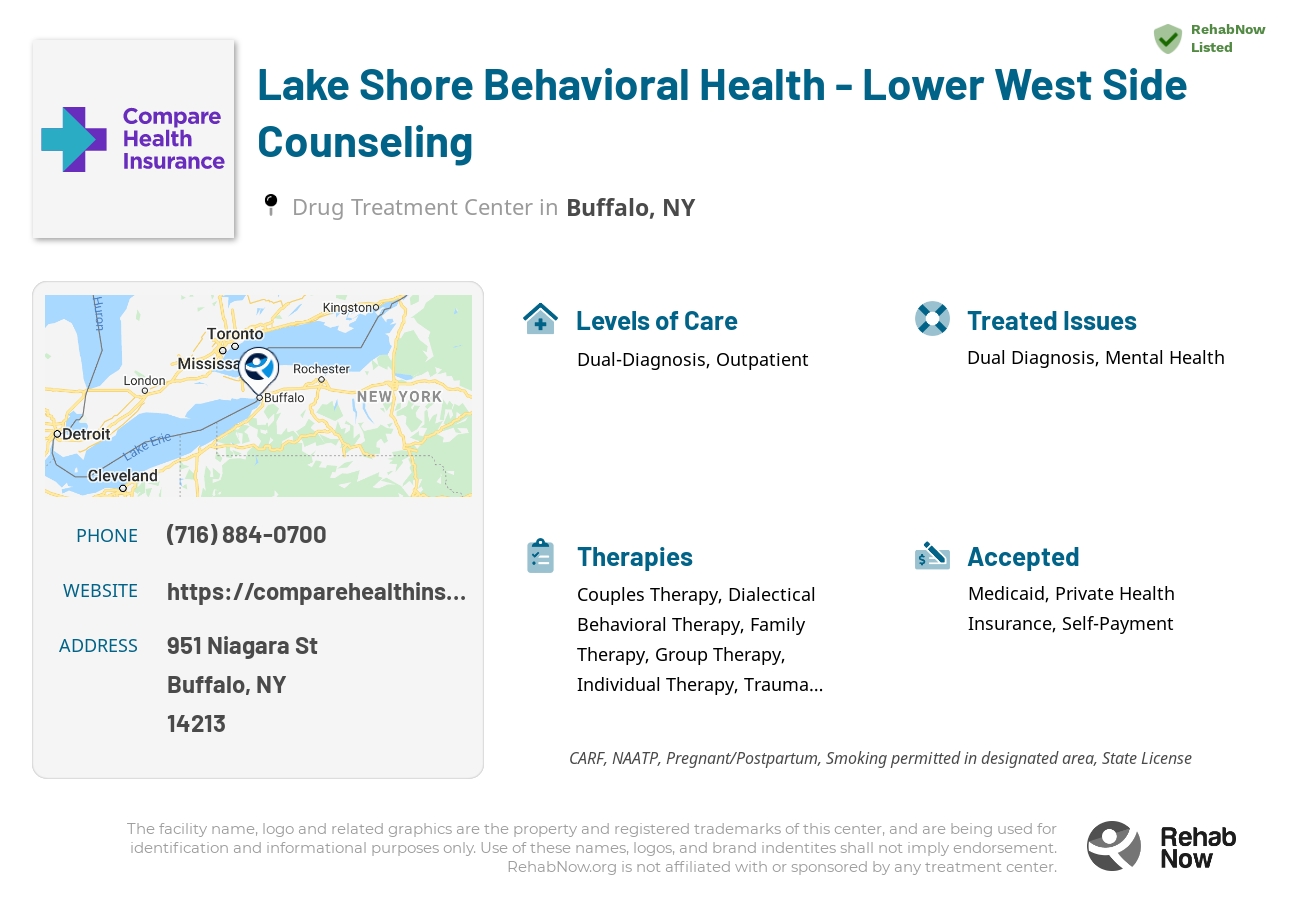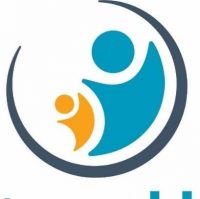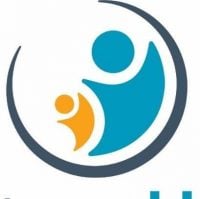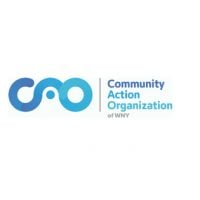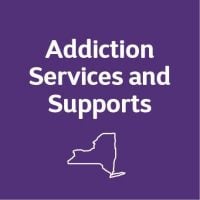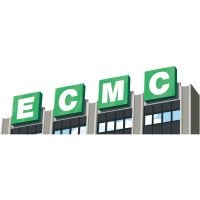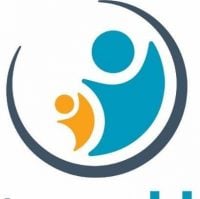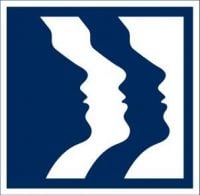Lake Shore Behavioral Health - Lower West Side Counseling
Drug Rehab Center in Buffalo, New York
Lake Shore Behavioral Health offers comprehensive and compassionate treatment for dual diagnosis and mental health issues through a range of therapy programs, including residential and outpatient care, using evidenced-based approaches and accepting most forms of private health insurance.
Multiple patients have reported Lake Shore Behavioral Health - Lower West Side Counseling as permanently closed.
Research other rehabs in Buffalo, New York, or get help finding an open facility.
About This New York Facility
Lake Shore Behavioral Health - Lower West Side Counseling is a dual diagnosis, mental health treatment facility located in Buffalo, New York. This center specializes in providing treatment for individuals who are struggling with dual diagnosis and mental health issues. The facility offers outpatient levels of care, making it an accessible option for those seeking help but prefer to continue their daily routines. Lake Shore Behavioral Health - Lower West Side Counseling accepts private health insurance, allowing individuals to utilize their coverage for treatment. Affiliated with Lake Shore Behavioral Health, this facility is committed to providing comprehensive care and support to those in need.
Lake Shore Behavioral Health - Lower West Side Counseling offers a range of services and treatment methods for individuals dealing with addiction and substance abuse. With a focus on dual diagnosis, their staff is equipped to address both the mental health and addiction aspects of a person's life. Through outpatient levels of care, individuals can receive therapy, counseling, and support while still maintaining their daily responsibilities. The facility utilizes evidence-based treatment methods to ensure the best possible outcomes for their patients. By incorporating various therapies such as cognitive-behavioral therapy and holistic approaches, Lake Shore Behavioral Health - Lower West Side Counseling provides individuals with a comprehensive and individualized treatment plan to aid in their recovery journey.
Genders
Ages
Modality
Additional
Conditions and Issues Treated
Mental illness includes conditions such as anxiety, depression, schizophrenia, bipolar disorder. It can also happen that mental illness causes drug addiction and vice versa. Lake Shore Behavioral Health - Lower West Side Counseling in New York knows it is vital to diagnose dual diagnosis or co-occurring disorder.
Levels of Care Offered at Lake Shore Behavioral Health - Lower West Side Counseling
This center offers a variety of custom treatment tailored to individual recovery. Currently available are Dual-Diagnosis, Outpatient, with additional therapies available as listed below.
Facilities like Lake Shore Behavioral Health - Lower West Side Counseling offer a variety of services, such as individual and group counseling and family therapy. During the sessions, you work with a team of experts that include: General physicians, Psychiatrists, Social Workers, and Psychologists. The main goals of outpatient recovery programs are to help addicted individuals reduce drug use and addictive behaviors, eventually becoming entirely sober.
Therapies & Programs
Therapy plays a major role in addiction recovery. It encourages patients to get to the root of their addiction and learn how to better handle the issues that led to using. Therapy can be conducted in group and one on one settings. In Lake Shore Behavioral Health - Lower West Side Counseling‘s individual therapy, the patient meets with the therapist in a one on one setting. This allows them to focus on the underlying issues of addiction and come up with solutions to prevent future abuse.
One of the most common areas of stress and damage during addiction is in intimate relationships. Addiction involves everyone in a family, not only the addict. Couples therapy can rebuild trust and joy that may have been damaged.
When the whole family is involved, healing can be far more successful. Family counseling involves genetic factors to the family of the addict. This offers the means to cope with addiction and its underlying emotional disorders for loved ones. It is a helpful method for addicts in helping to adjust to sober living.
Trauma therapy allows people who struggled with a past trauma to face the situation and learn to overcome the situation. Many people who went through trauma early on, struggle with addiction later in life. By addressing the trauma and moving past the issues, it can help someone attending treatment at Lake Shore Behavioral Health - Lower West Side Counseling in Buffalo, NY move forward with their recovery and begin to take a better hold of their sober future.
Payment Options Accepted
For specific insurance or payment methods please contact us.
Is your insurance accepted?
Ask an expert, call (888) 674-0062
Lake Shore Behavioral Health Associated Centers
Discover treatment facilities under the same provider.
- Lake Shore Behavioral Health - Mental Health in North Collins, NY
- Lake Shore Behavioral Health - Impact in Buffalo, NY
- Lake Shore Behavioral Health - Lackawanna Counseling in Orchard Park, NY
- Lake Shore Behavioral Health - North Collins in North Collins, NY
- Lake Shore Behavioral Health - Buffalo in Buffalo, NY
Learn More About Lake Shore Behavioral Health Centers
Additional Details
Specifics, location, and helpful extra information.
Buffalo, New York 14213 Phone Number(716) 884-0700 Meta DetailsUpdated November 25, 2023
Staff Verified
Patient Reviews
There are no reviews yet. Be the first one to write one.
Buffalo, New York Addiction Information
More than 2 million New Yorkers are currently suffering from some type of substance abuse and many of those are minors. Alcohol abuse, in particular, is prevalent among those underage. As a result of the high prices and regulation of prescription drugs, many New Yorkers turn to heroin instead. This has led to a serious heroin epidemic in the state.
10.8% of New Yorkers aged 12-17 reported using an illicit drug. In Buffalo, NY, the number of drug overdose deaths increased from 33 in 2015 to 70 in 2016. Methamphetamine use is rising in Buffalo, with more meth seized in 2017 than any other year on record. Buffalo is home to several treatment facilities. Treatment typically begins with a detoxification process, followed by individual and group therapy.
Treatment in Nearby Cities
- Highland, NY (265.6 mi.)
- Freeville, NY (132.6 mi.)
- Elmsford, NY (290.9 mi.)
- Lake Placid, NY (264.0 mi.)
- Poughkeepsie, NY (268.0 mi.)
Centers near Lake Shore Behavioral Health - Lower West Side Counseling
The facility name, logo and brand are the property and registered trademarks of Lake Shore Behavioral Health - Lower West Side Counseling, and are being used for identification and informational purposes only. Use of these names, logos and brands shall not imply endorsement. RehabNow.org is not affiliated with or sponsored by Lake Shore Behavioral Health - Lower West Side Counseling.

